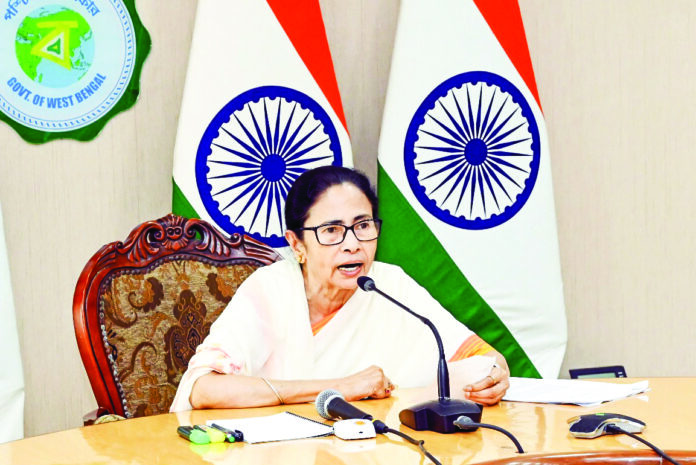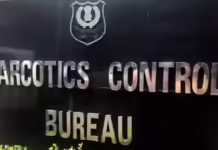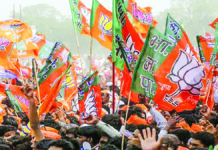
KOLKATA: With corruption and the Trinamool Congress (TMC) getting linked in the public mind after the mass-sacking of 26,000 teachers due to the recruitment scam linked to the party, Mamata Banerjee’s party has quietly prepared the blueprint for a fightback since Assembly elections are just months away. It’s a different matter that, officially, the party denies the charges as politically motivated.
But Trinamool leaders admit in private that a strategy has been communicated to the grassroots to turn the tables on the Opposition. As part of that strategy, the party faithful have been instructed to get into belligerent mode and cause disruption whenever Opposition leaders, particularly from the Bharatiya Janata Party, try to reach out to the public.
Bengal BJP president and junior Union Minister Sukanta Majumdar was the first to get a taste of this when “protesters” demanding unpaid wages for MGNREGA work confronted him while he was in Budge Budge’s Haldarpara on Thursday to meet an injured party worker. The protesters heckled him with “go back” slogans and black flags, besides calling him a “chor (thief)” and a “dangabaj (riot-monger)”. The protesters also jammed the area with tableaus mounted on commercial vehicles popularly known as “chhota haathi” bearing banners emblazoned with the word “chor”. The protesters jostled with Majumdar’s security guards and threw slippers at him. The TMC claims that it was the cadre of BJP that caused the disruption, although video evidence seems to show otherwise.
The protesters demanded the immediate unblocking of Central dues to Bengal, especially under the 100-day employment guarantee scheme, which he on several occasions proudly claimed credit for having halted.
Ultimately, Majumdar left the area with the assistance of the police and Central security forces.
Later, he told reporters: “Is this democracy? I am a Central Minister. My entire itinerary was mailed to the police in advance. Then why did this happen? Where are the police? Here the additional SP is moving around in civil dress. If it were us, we would have used Central forces to do whatever is required.
“The language hurled at me is demeaning and disrespectful. They even abused my mother. My upbringing stops me from using the same language against their (Trinamool) netas. But as long as I live, I will remember this.” Trinamool insiders told The Sunday Guardian that this would be the leitmotif going ahead, particularly against Majumdar and Leader of the Opposition Suvendu Adhikari to disturb and disrupt their mass outreach.
The second prong in the strategy is allegedly to use violence and the police against mid- and local-level Opposition leaders.
BJP leaders allege that this strategy is already in operation in the villages.
On Saturday morning, the body of BJP leader Sheikh Bakibulla was found hanging from the balcony of his residence in Hooghly district.
Bakibulla, who served as the mandal president of the BJP’s minority cell in Goghat, was reportedly discovered by his wife early in the morning. According to police sources, his hands were found tied in front—raising serious suspicions of foul play. His father alleged murder, while police await the autopsy report.
Local BJP MLA from Pursura, Biman Ghosh, visited the residence soon after the incident and alleged political motives behind the death.
“He was a well-known face in the area. This is clearly a political conspiracy,” Ghosh said, claiming the young leader had been targeted for his rising influence among minority voters.
“Violence at the grassroots will ensure that people cannot raise their voice, and the BJP cannot get booth-level workers. After all, which family will want their menfolk to get bashed up by either Trinamool or arrested by the police?” says former IPS officer Nazrul Islam.
The third prong in the strategy is to shift blame for the reverses in the courtrooms to the Opposition and even the judges who delivered the judgments.
The idea is to pin the blame for the mass sacking of 26,000 teachers and the stay of the OBC quota on Opposition leaders like CPM MP and advocate Bikash Bhattacharya who argued against the state government and specifically the High Court judges like Amrita Sinha, Rajashekhar Mantha and former Justice Abhijit Gangopadhyay.
The 26,000 teachers and non-teaching staff lost their jobs after a Supreme Court judgment in a case in which the former Trinamool Congress number two and Education Minister Partha Chattopadhyay and a host of party leaders are behind bars for corruption.
The government’s attempt to give a dole to terminated Group C and D employees was also shot down by the High Court bench of Justice Amrita Sinha.
“Once the Supreme Court decided the issue of illegal appointment conclusively and opined that the appointments were results of fraud, no person who was the beneficiary of a fraudulent act of the statutory authority ought to be provided any support, that too, from the public exchequer,” Justice Sinha stated in her order.
The Calcutta High Court also stayed the West Bengal government’s new OBC list, citing concerns over its constitutionality. Data shows that over 86% of newly added groups belong to a single community, raising questions about religious bias for electoral gain.
As television studios air hours of discussion on the party’s active role in corrupt practices in the recruitment of teachers and the political implications of filling the OBC quota with Muslim sub-castes, the party is positioning Mamata Banerjee as a “compassionate Chief Minister”.
“The people of Bengal know who has their best interests in mind and heart. Our leader Mamata Banerjee is a compassionate Chief Minister. She is continuously trying to help people while the Opposition leaders like Bikash Bhattacharya and his associates are snatching away the jobs and the benefits to the less fortunate sections of society,” said Trinamool Congress spokesperson Kunal Ghosh. “The role of judges like Abhijit Gangopadhyay, Amrita Sinha and Rajashekhar Mantha is also suspect,” he added.
As the Trinamool Congress rolls out its strategy over the next few months, the ballot boxes will hold the key to who managed the narrative better.







